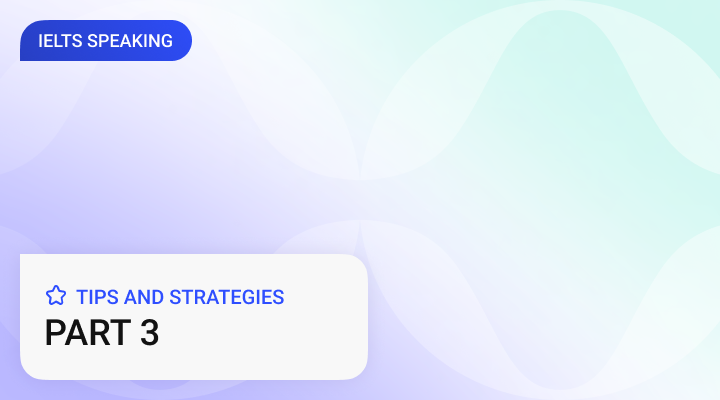Seeking to surpass expectations in Part 3 of your IELTS Speaking assessment? Your search ends now! These guidelines aim to provide you with valuable advice that will help you improve your IELTS band score to new heights.
We will unveil a treasure trove of dos and don'ts that you can utilize to your advantage during the examination.
IELTS exam tips
Imagine this situation: You're facing the examiner, preparing yourself for a barrage of questions. How can you maximize your chances of success? Take into account these crucial steps to enhance your likelihood of achieving your goals:
- Listen carefully to the examiner’s questions as you won’t see them in a written form.
- Ask questions to the examiner if you’ve missed the question or you don’t understand something.
- Examples: “Sorry, could you repeat the question, please?” or “What does the word _______ mean?”
- Give extended answers to the examiner’s questions to demonstrate the range of your vocabulary. Every answer should be a small story with details and examples where they’re relevant.
- You’ll have up to 1 min to answer each question, so use this time wisely to demonstrate your topic-specific and advanced vocabulary.
- Use a variety of grammar structures to boost your grammar score. You can include different tenses, the Passive voice, relative clauses, comparative and superlative adjectives and adverbs, modal verbs and so on.
- Give yourself time to think using fillers “well…”, “let me think…”.
- Be coherent and use linking devices such as moreover, however, although, etc.
- Keep fluency and accuracy in balance.
- Speak clearly at your natural pace and loudly enough.
- Be friendly and polite.
- Examples: “Sorry, I’ve missed that. Could you repeat the question, please?”, “Let me think…”.
Sailing through IELTS Speaking Part 3: Critical Errors to Steer Clear Of
Achieving mastery in the IELTS Speaking examination goes beyond mere language proficiency. It necessitates a profound awareness of potential obstacles and skillful maneuvering around them. To aid you in delivering your finest performance, here are some vital pitfalls to avoid when tackling IELTS Speaking Part 3.
- Don’t worry if you don’t know much about the topic. The examiner will assess only your English and ability to give arguments in English.
- If you aren’t sure about some place, date or fact, try to find another example.
- If it’s hard, you can say “I don’t remember exactly, but I guess…”, “I don’t know much about the topic, but I’ve heard that…”.
- Don’t repeat the words from the examiner’s questions if possible, try to paraphrase them so that you demonstrate the range of your vocabulary.
- Don’t use the words and grammar that you aren’t sure about, use what you know well.
- Don’t pause for too long if you can’t find the right word. Paraphrase or change the topic.
- Don’t panic if you’ve made a mistake. Correct yourself or just keep speaking.
- Don’t use very informal words and expressions at the exam.
- Examples: “wanna”, “kinda”, “stuff”.
- Don’t get upset if the examiner stops you in the middle of your speech. It just means that the examiner wants to move on to the next question and it won’t affect your grade.
Check out our tips on Part 1 and Part 2 in the following articles:
Enhance your vocabulary, sharpen your speaking skills, and practice regularly using the SmallTalk2Me platform. With SmallTalk2Me, you can simulate the IELTS speaking test experience by practicing with authentic exam questions. SmallTalk2Me will not only track your time and performance but also provide you with an accurate assessment of your IELTS band. Prepare yourself to shine in the IELTS Speaking test and achieve the score you desire with our online interactive IELTS mock tests.







